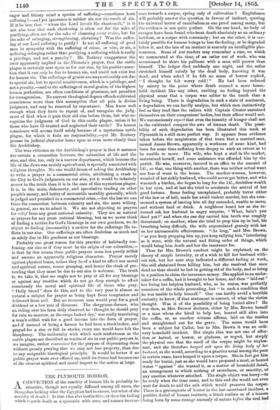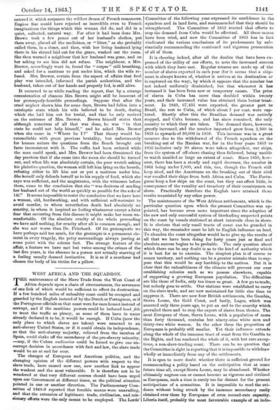THE PLYMOUTH HORROR.
A CONVICTION of the sanctity of human life is probably ja- il. stinctive, though not equally diffused among all races, the Mongolian lacking what the Egyptian had in excess, but what of the sanctity of death ? Is that idea also instinctive, or doss the feeling which rsgsrda death as a spectacle with awe, and resents irrever- ence towards a corpse, spring only of cultivation ? Englishmen will probably answer the question in favour of instinct, quoting the universal horror of cannibalism as one proof among many, but the evidence is not quite perfect. On the one hand, no body of savages have been found who treat death absolutely as an ordinary incident, or a corpse with contumely ; but on the other, it is cer- tainly possible for human beings to lose the feeling, or be degraded below it, and the loss of an instinct is scarcely an intelligible phe- nomenon. Some of our readers may remember a case, on which we commented at the time, of an ostler out of work, who was accustomed to share his palliasse with a man still poorer than himself. The lodger died suddenly one night, and the ostler stretched himself calmly by the dead body, knowing it was dead, and when asked if he felt no sense of horror replied, "I thought he felt werry cold ! " He had been reduced by misery to the point where death seemed a mere house- hold incident like any other, exciting no feeling beyond the physical sense that a corpse was colder to the touch than a living being. There is degradation in such a state of sentiment, a degradation we can hardly analyze, but which men instinctively feel as they read that the sailors with Captain Crozier sustained themselves on their companions' bodies, but their officer would not. We unconsciously expect that even the insanity of hunger shall not in the cultivated conquer the awe of human death. The possi- bility of such degradation has been illustrated this week at Plymouth in a still more perfect way. It appears from evidence taken before the magistrates of that town that a married man, named James Brown, apparently a workman of some kind, had been for some time suffering from dropsy to such an extent as to be unable to move. His wife, who kept a stall in the market, maintained herself, and some assistance was afforded him by the parish. He was, moreover, insured in an office to the amount of 14/., so that, one thing with another, there was neither actual want nor fear of want in the house. The market-woman, however, wearied of her sickly husband, who could never get better, and who was such a burden, she began to long for the 14/., doubtless wealth in her eyes, and at last she tried to accelerate the arrival of her good fortune. Some feeling unexplained, probably terror either of the law or of hell, made her avoid violent murder, but she com- menced a system of leaving him all day untended, unable to move, and without food or drink. A neighbour heard her as she re- turned ask her husband in angry surprise, "What, bain't you dead yet?" and when she one day carried him broth was roughly threatened; on another, when she tried to prop him up in bed, his breathing being difficult, the wife expostulated gravely with her on her unreasonable officiousness. "As long," said Mrs. Brown, "as you keep propping him up, you keep rallying him," interfering as it were, with the natural and fitting order of things, which would bring him death and her the insurance fee.
Thus far Mrs. Brown's conduct might be explained, on the theory of simple brutality, or of a wish to kill her husband with- out risk, but her next step indicated a different feeling at work. She still abstained from killing him, but she resolved that once dead no time should be lost in getting rid of the body, and so being in a position to claim the insurance money. She applied to an under- taker for a coffin, had it brought to her house, and then "laid out" her living but helpless husband, who, as he states, was perfectly conscious of the whole proceeding, but "in such a condition that he was unable to help himself." One can hardly avoid a horrible curiosity to know, if that statement is correct, of what the victim thought. Was it of the possibility of being buried alive? He was then, as Mrs. Brewer declares, either by Mrs. Brown herself or a man whom she hired to help her, heaved still alive into the coffin, or, as another witness affirms, laid on the trestles and straightened out for the grave. The scene would have been a subject for Calla, but to Mrs. Brown it was an ordi- nary household incident. Her single idea was not one of affec- tion or hatred, or horror, or gladness, or regret, but simply the physical one that the smell of the corpse might be unplea- sant, and she therefore heaped salt upon the living body of her husband, as she would, according to a practice usual among the poor in certain cases, have heaped it upon a corpse. She in fact got him ready for burial, just as she would have prepared a meal, or heated water " against " she wanted it, as a matter of household detail, an arrangement to which nothing of sacredness, or sanctity, or any emotion whatever attached. The single object was hurry—to be ready when the time came, and to this end she would not even wait for death to add the salt which would preserve the corpse. There is a grotesquerie of horror in the last-mentioned incident, a positive denial of human instincts, a blank realism as of a human being born by some strange anomaly of nature before the soul had
entered it. which surpasses the wildest dream of French romancers. Eugene Sue would have rejected as incredible even to French imaginations the things which this woman did do, and did in a quiet, collected, natural way. For after it had been done Mrs. Brown took a few pence out of her husband's clothes, put them away, placed all the medicines, or "litter," as she probably called them, in a closet, and then, with her living husband lying there in his shroud laid out for the grave, washed out the room. She then warned a neighbour that her husband was gone, and on her asking to see him did not refuse. The neighbour, a Mrs. Brewer, accordingly went in, found the " corpse " still breathing, and asked for a mattress to put under him, which the wife re- fused. Mrs. Brewer, certain from the aspect of affairs that foul play was intended, informed the parish authorities, and the husband, taken out of her hands and properly fed, is still alive.
It occurred to us while reading the report, that by a strange concatenation of chances Mrs. Brown might still be innocent of her grotesquely-horrible proceedings. Suppose that after the cruel neglect shown him for some days, Brown had fallen into a cataleptic state which his wife believed to be death, during which she laid him out for burial, and that he only revived on the entrance of Mrs. Brewer. Brown himself states that although conscious of all that was done, he was "in that state he could not help himself," and he asked Mrs. Brewer when she came in "Where be I?" That theory would be- reconcilable with great previous brutality, but unfortunately for human nature the questions from the Bench brought out facts inconsistent with it. The coffin had been ordered while the man could speak, and Mrs. Brewer had been threatened the day previous that if she came into the room she should be turned out, and when life was absolutely certain, the poor wretch asking his plaintive question, the woman still left him lying on the boards, refusing either to lift him out or put a mattress under him. She herself only defends herself as to his supply of food, which she says was sufficient, and the magistrates, with the witnesses before them, came to the conclusion that she "was desirous of sending her husband out of the world as quickly as possible for the Enke of 141." It seems impossible to resist the conclusion that we have here a woman, old, hardworking, and with sufficient self-restraint to avoid murder, to whom nevertheless death had absolutely no sanctity, in whom it inspired no feeling whatsoever except a faint fear that occurring from this disease it might make her room un- comfortable. Of the absolute cruelty of the whole proceeding we have said nothing, for cruelty after all is common enough, and -she was not worse than Dr. Pritchard. Of its grotesquerie we have perhaps said too much, for the grotesque is a permanent de- ment in every tragedy, the petty surroundings always jarring at some point with the solemn fact. The strange feature of the affair, a feature we have met but twice among the crimes of the last five years, is the absence in a person not actually starving of a feeling usually deemed instinctive. It is as if a murderer had -chosen the body of his victim for a pillow.































 Previous page
Previous page